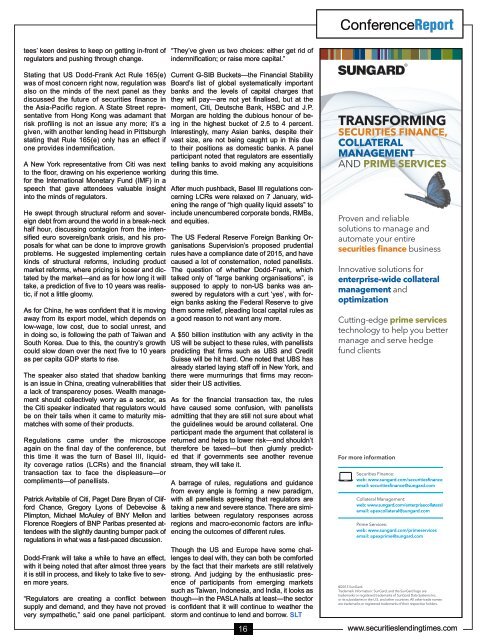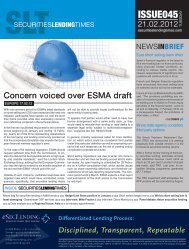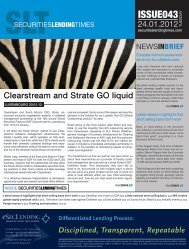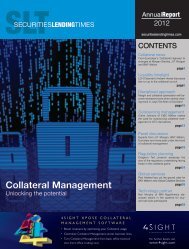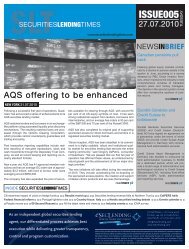read - Securities Lending Times
read - Securities Lending Times
read - Securities Lending Times
Create successful ePaper yourself
Turn your PDF publications into a flip-book with our unique Google optimized e-Paper software.
ConferenceReport<br />
tees’ keen desires to keep on getting in-front of<br />
regulators and pushing through change.<br />
“They’ve given us two choices: either get rid of<br />
indemnification; or raise more capital.”<br />
Stating that US Dodd-Frank Act Rule 165(e)<br />
was of most concern right now, regulation was<br />
also on the minds of the next panel as they<br />
discussed the future of securities finance in<br />
the Asia-Pacific region. A State Street representative<br />
from Hong Kong was adamant that<br />
risk profiling is not an issue any more; it’s a<br />
given, with another lending head in Pittsburgh<br />
stating that Rule 165(e) only has an effect if<br />
one provides indemnification.<br />
A New York representative from Citi was next<br />
to the floor, drawing on his experience working<br />
for the International Monetary Fund (IMF) in a<br />
speech that gave attendees valuable insight<br />
into the minds of regulators.<br />
He swept through structural reform and sovereign<br />
debt from around the world in a break-neck<br />
half hour, discussing contagion from the intensified<br />
euro sovereign/bank crisis, and his proposals<br />
for what can be done to improve growth<br />
problems. He suggested implementing certain<br />
kinds of structural reforms, including product<br />
market reforms, where pricing is looser and dictated<br />
by the market—and as for how long it will<br />
take, a prediction of five to 10 years was realistic,<br />
if not a little gloomy.<br />
As for China, he was confident that it is moving<br />
away from its export model, which depends on<br />
low-wage, low cost, due to social unrest, and<br />
in doing so, is following the path of Taiwan and<br />
South Korea. Due to this, the country’s growth<br />
could slow down over the next five to 10 years<br />
as per capita GDP starts to rise.<br />
The speaker also stated that shadow banking<br />
is an issue in China, creating vulnerabilities that<br />
a lack of transparency poses. Wealth management<br />
should collectively worry as a sector, as<br />
the Citi speaker indicated that regulators would<br />
be on their tails when it came to maturity mismatches<br />
with some of their products.<br />
Regulations came under the microscope<br />
again on the final day of the conference, but<br />
this time it was the turn of Basel III, liquidity<br />
coverage ratios (LCRs) and the financial<br />
transaction tax to face the displeasure—or<br />
compliments—of panellists.<br />
Patrick Avitabile of Citi, Paget Dare Bryan of Clifford<br />
Chance, Gregory Lyons of Debevoise &<br />
Plimpton, Michael McAuley of BNY Mellon and<br />
Florence Roegiers of BNP Paribas presented attendees<br />
with the slightly daunting bumper pack of<br />
regulations in what was a fast-paced discussion.<br />
Dodd-Frank will take a while to have an effect,<br />
with it being noted that after almost three years<br />
it is still in process, and likely to take five to seven<br />
more years.<br />
“Regulators are creating a conflict between<br />
supply and demand, and they have not proved<br />
very sympathetic,” said one panel participant.<br />
Current G-SIB Buckets—the Financial Stability<br />
Board’s list of global systematically important<br />
banks and the levels of capital charges that<br />
they will pay—are not yet finalised, but at the<br />
moment, Citi, Deutsche Bank, HSBC and J.P.<br />
Morgan are holding the dubious honour of being<br />
in the highest bucket of 2.5 to 4 percent.<br />
Interestingly, many Asian banks, despite their<br />
vast size, are not being caught up in this due<br />
to their positions as domestic banks. A panel<br />
participant noted that regulators are essentially<br />
telling banks to avoid making any acquisitions<br />
during this time.<br />
After much pushback, Basel III regulations concerning<br />
LCRs were relaxed on 7 January, widening<br />
the range of “high quality liquid assets” to<br />
include unencumbered corporate bonds, RMBs,<br />
and equities.<br />
The US Federal Reserve Foreign Banking Organisations<br />
Supervision’s proposed prudential<br />
rules have a compliance date of 2015, and have<br />
caused a lot of consternation, noted panellists.<br />
The question of whether Dodd-Frank, which<br />
talked only of “large banking organisations”, is<br />
supposed to apply to non-US banks was answered<br />
by regulators with a curt ‘yes’, with foreign<br />
banks asking the Federal Reserve to give<br />
them some relief, pleading local capital rules as<br />
a good reason to not want any more.<br />
A $50 billion institution with any activity in the<br />
US will be subject to these rules, with panellists<br />
predicting that firms such as UBS and Credit<br />
Suisse will be hit hard. One noted that UBS has<br />
al<strong>read</strong>y started laying staff off in New York, and<br />
there were murmurings that firms may reconsider<br />
their US activities.<br />
As for the financial transaction tax, the rules<br />
have caused some confusion, with panellists<br />
admitting that they are still not sure about what<br />
the guidelines would be around collateral. One<br />
participant made the argument that collateral is<br />
returned and helps to lower risk—and shouldn’t<br />
therefore be taxed—but then glumly predicted<br />
that if governments see another revenue<br />
stream, they will take it.<br />
A barrage of rules, regulations and guidance<br />
from every angle is forming a new paradigm,<br />
with all panellists agreeing that regulators are<br />
taking a new and severe stance. There are similarities<br />
between regulatory responses across<br />
regions and macro-economic factors are influencing<br />
the outcomes of different rules.<br />
Though the US and Europe have some challenges<br />
to deal with, they can both be comforted<br />
by the fact that their markets are still relatively<br />
strong. And judging by the enthusiastic presence<br />
of participants from emerging markets<br />
such as Taiwan, Indonesia, and India, it looks as<br />
though—in the PASLA halls at least—the sector<br />
is confident that it will continue to weather the<br />
storm and continue to lend and borrow. SLT<br />
16<br />
tranSForMing<br />
SecuritieS Finance,<br />
collateral<br />
ManageMent<br />
and PriMe ServiceS<br />
Proven and reliable<br />
solutions to manage and<br />
automate your entire<br />
securities finance business<br />
Innovative solutions for<br />
enterprise-wide collateral<br />
management and<br />
optimization<br />
Cutting-edge prime services<br />
technology to help you better<br />
manage and serve hedge<br />
fund clients<br />
For more information<br />
<strong>Securities</strong> Finance:<br />
web: www.sungard.com/securitiesfinance<br />
email: securitiesfinance@sungard.com<br />
Collateral Management:<br />
web: www.sungard.com/enterprisecollateral<br />
email: apexcollateral@sungard.com<br />
Prime Services:<br />
web: www.sungard.com/primeservices<br />
email: apexprime@sungard.com<br />
©2013 SunGard.<br />
Trademark Information: SunGard, and the SunGard logo are<br />
trademarks or registered trademarks of SunGard data Systems Inc.<br />
or its subsidiaries in the U.S. and other countries. all other trade names<br />
are trademarks or registered trademarks of their respective holders.<br />
www.securitieslendingtimes.com


